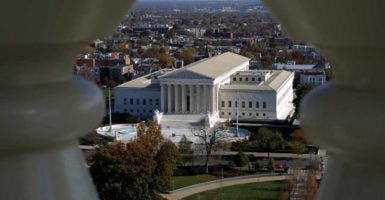President-elect Donald Trump has narrowed his potential Supreme Court picks to only the federal appeals court judges on his broad list of potential nominees, according to CNN.
CNN reported that Vice President-elect Mike Pence said the team is “winnowing” the list that “is made up of mostly federal appellate court judges.” That doesn’t automatically mean all the others are off the list yet, according to Pence.
Appeals court judges on the list of 21 are Steven Colloton, Neil Gorsuch, Thomas Hardiman, Raymond Kethledge, William Pryor, and Diane Sykes. However, the story also mentions Michigan Supreme Court Justice Joan Larsen.
Pence met with senators Wednesday about the potential pick, including Sen. Joe Manchin, D-W.V.
“There’s been some of the people on that list who have already gone through the process here as far as approving,” Manchin told CNN. “I guess they would look at someone who has gone through, somebody who’s made it through here before would have a chance.”
Trump said during his Wednesday press conference he would be making a decision on a Supreme Court justice choice within two weeks of his Jan. 20 inauguration.
The Trump transition team did not immediately respond to an inquiry from The Daily Signal as to whether the CNN report on the short list was accurate.
Here’s a look at all of the seven appeals court judges on the list, in alphabetical order.
- Michigan Supreme Court Justice Joan Larsen was named to the state’s high court by Gov. Rick Snyder, a Republican. Larsen, 48, in 2002 became an assistant attorney general in the Justice Department’s Office of Legal Counsel. Larsen, who also taught law at the University of Michigan, received her law degree from Northwestern and clerked for the late Justice Antonin Scalia.
- Judge William H. Pryor Jr., a President George W. Bush appointee, has served since 2004 on the U.S. Court of Appeals for the 11th Circuit in Alabama, and there was a fight to get him on the court. Interestingly, Pryor’s comment about “nine octogenarian lawyers who happen to sit on the Supreme Court” deciding on the death penalty became an issue during his appeals court confirmation fight. Pryor’s confirmation came only after the May 2005 “Gang of 14” bipartisan Senate compromise, to break a Democratic filibuster of several Bush judicial nominations and also prevent the Republican leadership from invoking the so-called “nuclear option,” of curbing the filibuster. In a 53-45 vote, the Senate confirmed Pryor the following month. Pryor, 54, has a political background. He became Alabama’s attorney general in 1997 after his predecessor, Jeff Sessions, was elected to the U.S. Senate as a Republican. Trump designated Sessions to be his next attorney general. Pryor was elected in his own right in 1998 as state attorney general and was re-elected in 2002. In 2013, he was confirmed to a term on the United States Sentencing Commission. Pryor received his law degree from Tulane University.
- Judge Thomas Hardiman was appointed by Bush in 2007 to the U.S. Court of Appeals for the 3rd Circuit in Pennsylvania. The Senate confirmed him 95-0 in March 2007. Hardiman, 51, previously was a federal district judge for the Western District of Pennsylvania, a position confirmed by a voice vote in October 2003. A Notre Dame graduate, Hardiman practiced law in Washington and Pittsburgh.
- Judge Steven Colloton of the U.S. Court of Appeals for the 8th Circuit in Iowa was appointed in 2003 by Bush. The Senate confirmed him in September 2003 by a vote of 94-1. Colloton previously served as a U.S. attorney for the Southern District of Iowa. The 53-year-old graduate of Yale Law School clerked for the late Supreme Court Chief Justice William Rehnquist.
- Judge Neil Gorsuch, 49, of the U.S. Court of Appeals for the 10th Circuit in Colorado, was appointed in 2006 by Bush. The Senate confirmed him by a voice vote in July 2006. Before that, Gorsuch was a deputy assistant attorney general at the Justice Department. The Harvard Law School graduate clerked for both current Supreme Court Justice Anthony Kennedy and former Justice Byron White.
- Judge Diane Sykes of the U.S. Court of Appeals for the 7th Circuit in Wisconsin was named by Bush. The Senate confirmed her by a vote of 70-27 in March 2004. Sykes, 58, had been a justice on the Wisconsin Supreme Court since 1999. Before that, she was a trial court judge in both civil and criminal matters. She received her law degree from Marquette University.
One federal appeals court judge on the list of 21 who wasn’t mentioned in the CNN story is Judge Raymond Gruender, 53. He was named by Bush to the U.S. Court of Appeals for the 8th Circuit in Missouri. The Senate voted 97-1 to confirm him in May 2004. He previously was a prosecutor and served as the U.S. attorney for the Eastern District of Missouri. He received his law degree from Washington University in St. Louis.
“Somebody who’s made it through here before would have a chance,” @Sen_JoeManchin says.
With a few exceptions, such as Justice Elena Kagan and retired Justice Sandra Day O’Connor, most justices in modern times have been federal appeals court judges. The list Trump considered was intriguing because it included many state supreme court justices, as well as Sen. Mike Lee, R-Utah.
Generally, there is a reason most justices are drawn from federal appeals courts, said John Malcolm, director of the Edwin Meese III Center for Legal and Judicial Studies at The Heritage Foundation.
“Federal appeals court judges have written more legal opinions about matters that are likely to go before the Supreme Court, while state supreme court justices have ruled mostly on state law and not federal law,” Malcolm, a former deputy assistant attorney general, told The Daily Signal.
But there is also merit to having state supreme court judges, said J. Christian Adams, a former Justice Department lawyer and president of the Public Interest Legal Foundation.
“I’m big fan of state Supreme Courts just because I think they might have a better understanding of overreach by the federal government, but the list I saw, they are all good names and any one would be fantastic,” Adams told The Daily Signal.































